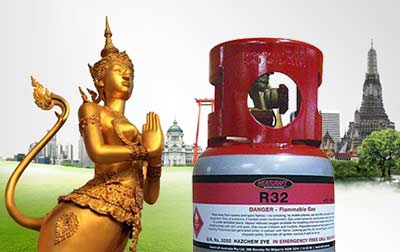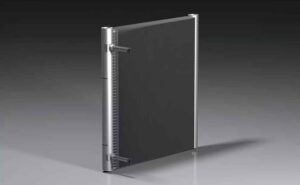Daikin leads Thailand’s switch to R32
27th April 2015 JAPAN: Daikin is to provide technical assistance to 12 Thai air conditioning equipment manufacturers to convert production from R22 to R32.
JAPAN: Daikin is to provide technical assistance to 12 Thai air conditioning equipment manufacturers to convert production from R22 to R32.
As the world’s leading air conditioning manufacturer, Daikin has been pushing for the adoption of R32 as both a low GWP replacement for R410A and as the refrigerant of choice for countries still dependent on R22.
Backed by the Japanese Ministry of Economy, Trade and Industry (METI), the project in Thailand has been approved by the Multilateral Fund for the Implementation of the Montreal Protocol.
As an emerging country, Thailand has been quickening the pace for conversion away from R22 to refrigerants with low impact on global warming. It recently announced a policy to complete conversion from R22 to R32 by 2017. Indonesia has made a similar pledge.
The Japanese government’s METI project provides financial aid as well as technological support. According to Daikin, several companies were approached for the project but Daikin was chosen due to the fact that it was the first manufacturer in the world to adopt R32 in air conditioners. Daikin, of course, is also a producer of R32 and holds patents on use of the refrigerant which it has previously said it would waive to help developing countries.
The 12 Thai companies are believed to be: United Technology Development, PPJ Engineering, Subsuksiri, Thrub-Thong Hou, Unico Consumer Products, Supreme CNB Corp, B Grimm Air-conditioning, Eminent Air (Thailand), Pan-Tycoon, Better Living, Bitwise (Thailand) and Saijo Denki International.
In addition to basic knowledge, including refrigerant properties and safety training for the manufacturing facilities, Daikin will also provide installation and maintenance guidance. The Japanese manufacturer will also continue to provide support after the plants have been converted. Subsidiary company Daikin Industries (Thailand) Ltd will oversee overall schedule and planning support, and distributor Siam Daikin Sales Co will be responsible for installation and maintenance guidance.
Dr Pasu Loharjun of the Thai government’s Department of Industry urged industry to switch to the new gas and emphasised that the new refrigerant, despite having a 10% higher purchasing cost, was more efficient and required less refrigerant charge, resulting in an air conditioner that was30-40% smaller.
Daikin is currently second to Mitsubishi Electric in Thailand’s residential air conditioning market but has previously stated its ambition to become become the leader in three to five years.







